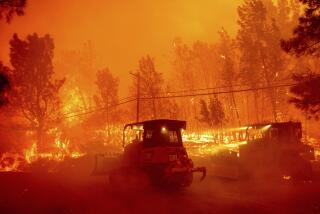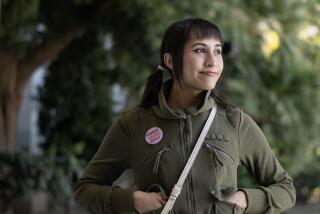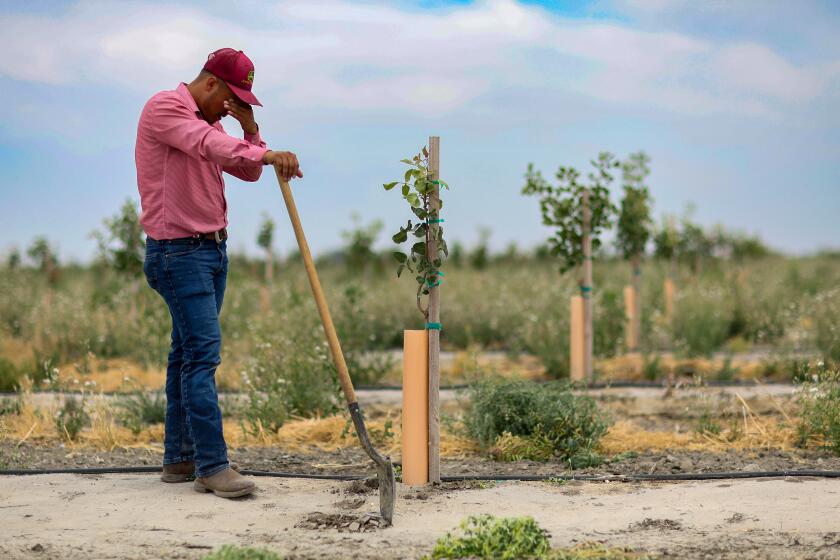Many Count O.C. Priest Among Their Blessings : Anniversary: Those touched by social activism and ‘magic’ of Msgr. Coffield will help him mark a milestone.
Juan Carlos Cruz Martinez wasn’t at all pleased when the lanky, gray-haired priest appeared at his bedside at Mission Hospital Regional Medical Center in Mission Viejo.
But the Roman Catholic priest kept returning, doing his best to lift the spirits of the 18-year-old Mexican who had lost both legs when he slipped under the wheels of a train he was trying board as it passed through the Capistrano Beach neighborhood of Dana Point.
“He would tell me jokes and tell me about God,” said Cruz, who found himself warming to the kind man with the quick smile. And now, a year later, he gives Msgr. John V. Coffield much of the credit for helping him overcome his despair--and changing his life for the better.
Before the accident, Cruz said he was addicted to drugs and alcohol and ran with street gangs in Mexico.
Today he is learning to walk with artificial limbs while living with a family in San Juan Capistrano that answered Coffield’s call for help. He is also learning English and to play a guitar that Coffield surprised him with when he completed his physical rehabilitation at Rancho Los Amigos Medical Center in Downey.
Cruz says he is a Christian now and wants to help others who may be in danger of giving up hope. When the youth talks about his gratitude to the people who have helped him and his plans, Coffield, his close friend and mentor, smiles broadly and waves a fist vigorously to cheer him on.
On June 16, Cruz will sing in a choir at a Mass to celebrate Coffield’s 50th anniversary as a priest. He will be among a throng of about 800 Coffield admirers, ranging from clergy of many faiths to children and lay activists, including Cesar Chavez, who will attend festivities at the San Juan Capistrano Mission in honor of the 77-year-old priest.
For the last decade Coffield has worked his “magic,” as one of his friends described it, at a small, predominantly Latino church in a poverty pocket of Capistrano Beach. Nearby a street is lined each morning with Mexican dayworkers and each Thursday the unemployed are fed in the church’s adjoining hall.
At San Felipe de Jesus Catholic Church, Coffield is affectionately known as Juanote (Big John) by many of his parishioners, who call on him to come to their rescue with his fluent Spanish, kind heart and network of community resources whenever someone is in trouble.
Before Cruz there was another young man named Sabino, an illegal immigrant from Mexico, who was impaled on the stake of a fence he tried to jump near San Clemente.
Barbara Centeno, who works at the St. Vincent de Paul Thrift Shop in San Juan Capistrano, recalled that when her husband heard the man was in Samaritan Medical Center-San Clemente, he told Coffield, who took the gravely injured man under his wing.
“He was tender and loving with him, took him to lunch often and spent a lot of time with him,” Centeno recalled. “He was sort of like his daddy.”
Nowadays, Coffield’s ministry of good deeds is accomplished quietly as he makes himself available on a daily basis to his congregation. His calender in a “little black book” is filled with names of people he counsels and his blue Honda Civic with the white rosary draped on the rear view mirror is more often seen out in the community than parked in front of the church.
Few of his parishioners know much about Coffield’s past, other than sketchy stories about differences of opinion he once had with the former head of the Los Angeles archdiocese. But the clergyman was not always so low-key.
The celebration at San Juan Capistrano Mission this month will mark Coffield’s half century as a priest during which he has distinguished himself as a social activist who has been unafraid to speak his mind even at the cost of alienating powerful superiors in the church hierarchy.
Born in Indiana to a middle-class family of mostly Irish descent, Coffield said he had wanted to become a priest since the age of 5, when he played at saying the Mass and wore miniature red vestments that were a gift from his grandmother.
After his family moved to El Paso, he became interested in working with Mexicans. “I’m a gringo they seem to think is simpatico, “ he said.
His mission to the poor, he said, took shape when as a seminarian he heard a talk by Dorothy Day, a woman who had opened a house of hospitality for the needy in New York.
“It was so thrilling to me that the church had a way to reach out and serve the poor,” he said.
A student of Saul David Alinsky, the radical teacher of community organizing from Chicago, Coffield has spurred residents of Los Angeles and Orange County barrios to fight city halls and boards of supervisors for better schools, housing, parks and garbage collection.
He worked with East Los Angeles gangs in the 1940s when they were known as the “zoot-suiters” after the high-waisted, baggy trousers they wore. He marched with Dr. Martin Luther King Jr. in Selma, Ala., and fasted for the cause of migrant farm workers in Delano.
In 1964, Coffield clashed with Cardinal James Francis McIntyre, then head of the Los Angeles archdiocese, over Coffield’s outspoken campaign against a ballot measure that he believed would sanction discrimination against racial minorities in housing. He was asked to leave the state until the election and then went into self-imposed exile for four years when the measure passed.
Coffield spent those years learning more about social activism in Chicago and ministering to migrant farm workers in Oklahoma.
After the housing proposition was declared unconstitutional by the courts and repealed, he returned to California but was restricted from diocesan work for another year.
“In those days he was miles ahead of the church hierarchy in terms of human rights and labor rights, the things we take for granted today. He is a great advocate, truly living the Gospel,” Chavez says of his old friend.
Changes in the Southern California church hierarchy have made Coffield’s political stance acceptable in more recent years, culminating 10 years ago when he received the title of monsignor from the Diocese of Orange.
Just before McIntyre retired, he brought Coffield back into the diocesan fold by assigning him in 1969 as pastor at Our Lady of Guadalupe Church in Santa Ana. There he continued his work among the poor and was instrumental in the founding of the Santa Ana Organizing Committee (Sano) that regularly filled the City Council chambers with citizens lobbying for better services.
Amin David, former chairman of Sano and president of Los Amigos of Orange County, a social issues advocacy group, called Coffield “the closest thing Orange County has to angels or Mahatma Gandhi or Cesar Chavez.”
In appearance, Coffield today is a different man from the one who, in his heyday, called press conferences in defiance of his vicar. He is fragile looking, made gaunt by an illness and a strict diet he adheres to in order to combat food allergies. While he once weighed 225 pounds, his 135 pounds are now taut over his 6-foot-2 frame.
A mysterious lingering fever forced him to “retire” in 1975.
But many who know Coffield say that retirement is not an accurate description of his busy schedule.
Jesse Michel said when he was appointed deacon of the newly established San Felipe de Jesus Parish in 1981, he asked Coffield to come serve as a priest. He said Coffield responded enthusiastically, even though at the time his health was poor and he didn’t have enough stamina to stand through a Mass. “In those days it looked as though a strong wind would blow him away.”
But gradually, Michel recalled, the priest’s physical strength returned to match his spiritual vitality. Coffield helped an effort to provide affordable housing in Capistrano Beach by mobilizing the people of the parish to turn out in large numbers at government meetings.
Allen Baldwin, executive director of the Community Housing Corp. in Santa Ana, credited Coffield’s confidence with keeping people motivated.
“He kept us going and he kept us taking risks,” Baldwin said. “When a person places his faith in you like he did it creates a monumental obligation.”
Ultimately a blue and gray 24-unit apartment complex was built on land next to the church and occupied by low-income families in 1984. It was named after Coffield.
Not everyone believes Coffield’s goals are realistic. “He wanted the whole valley in affordable housing,” said Lawrence F. Buchheim, a San Juan Capistrano city councilman and landowner in Capistrano Beach, who resisted the clergyman’s suggestion that he use his property for low-income housing. “But you have to give him an A for effort.”
Having no stomach for administrative duties, Coffield is happy to leave that to Father Colman Nolan, the pastor at San Felipe, so he can spend more time doing what he does best: social activism.
Coffield lives with a family in San Clemente and usually takes breakfast and lunch with friends and dines with various families in the evenings.
“At first we didn’t know what to think of a priest asking us out for coffee,” said Joyce Lokker, who is a regular breakfast companion of Coffield’s on Mondays.
But Lokker, a San Clemente resident who is one of a group of Anglos who attend weekday morning Masses in English at San Felipe, says she and others who meet over meals with Coffield have learned to value his advice, friendship and sense of humor.
Coffield, who has allergies to junk foods, brings along a bag of vegetables to breakfast at a nearby Carl’s Jr. that the restaurant workers willingly cook in a microwave.
A frugal man who has been known to frequently dip into his small salary to assist the poor, Coffield said he has no interest in luxuries other than books, which he says he gives away after he reads.
“Instead of becoming richer we should want to become poorer to be more attached to people than to things,” he said. “It is strange that they (most people) don’t buy that. They have been brainwashed by the culture we are in to want more.”
More to Read
Sign up for Essential California
The most important California stories and recommendations in your inbox every morning.
You may occasionally receive promotional content from the Los Angeles Times.






